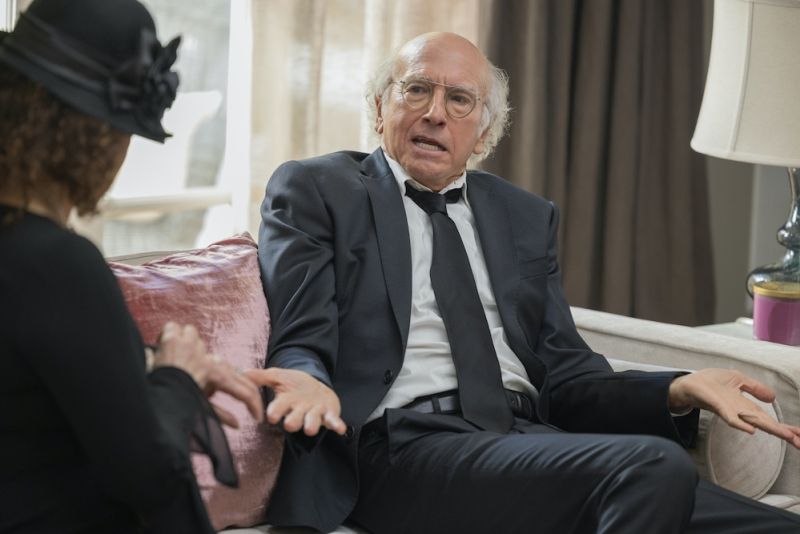
c/o indiewire.com
This article contains spoilers for “Curb Your Enthusiasm” Season 11.
If “Seinfeld” was a show about nothing, “Seinfeld” co-creator Larry David’s “Curb Your Enthusiasm” is a show about even less than nothing.
“Curb” debuted in 2000 and depicts a fictionalized version of David’s daily life as an established Hollywood writer-producer to often hilarious effect, employing none of the scripts or laugh tracks that marked the comedian’s earlier work. Now halfway through its 11th season, the show’s sheer longevity nevertheless begs the question: How long can David keep the magic going? Despite some questionable narrative and stylistic nuances, the new episodes of “Curb” show that the series can still pack a serious comedic punch in 2021.
By the time I saw my first episodes of “Curb” at the age of 11, the show had already matured into its second decade. Yet David’s hysterical misunderstandings, disputes, and love-hate relationships with his set cast of friends continued to produce some of the funniest TV I had seen up until that point. Lacking a script or overarching narrative, the show shined in its simplicity, turning what should have been a pointless premise into 45-minute segments of freewheeling comedy. In more recent years, however, “Curb” has begun standardizing this highly informal framework, to varying degrees of success.
The show’s 9th season, airing in 2017 after a six-year hiatus, maintained these core elements while constructing them around a more concrete story—specifically that David, writing a musical about Salman Rushdie called “Fatwa,” must escape a real condemnation to death by the Ayatollah of Iran. While this season’s scenes felt tighter and more staged than ever before, its narrative and performances (such as that of guest co-star Lin-Manuel Miranda ’02) were ridiculous enough to preserve the show’s comedic excellence. In season 10, Larry’s scenes approached real societal issues such as the #MeToo movement, with most of the episodes revolving around misunderstandings of conduct between the writer and female characters. Though still sparking funny moments, this choice fractured David’s role of always being right in situations with others, with some scenes placing our protagonist in less comfortable gray areas.
So far, season 11 keeps the more scripted, fast-paced David of recent years while thankfully addressing the real world only in bits and pieces. The focus of the first three episodes, which see Larry pitching a new show about his younger self to networks while being forced to cast an actor who can’t act, places Larry back in the positions he works best in. As David’s idea bounces between the offices of companies like Netflix and Hulu, the comedian contends with hosts of absurd executives, always breaking with them over petty things such as slamming the door too loudly. Here, the show only briefly acknowledges current events such as the COVID-19 pandemic, which it accomplishes through the discovery that one of David’s friends is a COVID hoarder, stockpiling masks and hand sanitizer. While the joke falls flat—none of the characters ever appear to actually need masks or hand sanitizer—it takes up only a brief portion of the first episode.
With episode four, “The Watermelon,” the season begins relying upon less fruitful—and often questionable—plotlines touching too close to the real world. In one, Larry accidentally walks into a man on the sidewalk, spilling his coffee all over the white sheet the man is carrying and subsequently promising to dry clean it for him. While this sounds like a classic “Curb” setup, the fact that Larry can see that the sheet is actually a Ku Klux Klan robe the man is bringing to a rally makes his choice to clean it for him indefensible. Never one for politeness, Larry gives no reason for being courteous to, of all people, a Klan member, leaving other characters to criticize his actions in ways he is usually supposed to do with others. While “Curb” has never shied away from shocking imagery—in season 7, Larry accidentally teaches a kid how to draw a swastika—it has always done so without finding Larry culpable. The show’s funniest moments rest on this tense question of blame, leaving cracks in our misunderstood hero’s façade whenever he does something clearly wrong on purpose.
The season’s fifth and most recent episode, “IRASSHAIMASE!,” highlights the increasingly scripted and cinematic nature of the later “Curb” seasons, though it sets David in more of the witty situations he works best in. In the episode’s opening, Larry is eating with his friends at a golf club restaurant when a man at another table starts having a heart attack. In typical fashion, David inappropriately starts sitting back down to his food while everyone else in the room still stands to watch the struggling club member, making eye contact with the man’s son as he digs into his French onion soup. While this scene presents a classic Larry David faux pas, each of its elements, from his conversation with friends at the beginning to his eye contact with the son, seems staged. The conversation goes through a seemingly rehearsed set of beats, interrupted punctually by the heart attack event, which then resolves the scene predictably with David getting himself into a new misunderstanding. It is as if the show is rushing to set up a classic “Curb” situation, and in doing so, shedding the casual pacing that has always given the series its loose comedic charm.
Though appearing slightly more scripted and morally vague in its 11th season, “Curb” retains a fantastic ability to spark laughter, especially for a show that just turned 21. When not brushing up against serious topics or relying upon pre-planned dialogue, “Curb” is a show just as fun as the one I watched as a kid, helmed by a comedic powerhouse that shows no signs of quitting. As the season pushes on, I’ll continue to tune in, awaiting whatever preposterous situation Larry David gets into next.
Aiden Malanaphy can be reached at amalanaphy@wesleyan.edu.